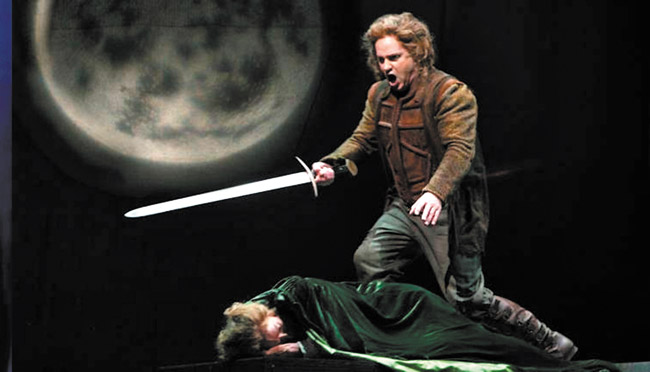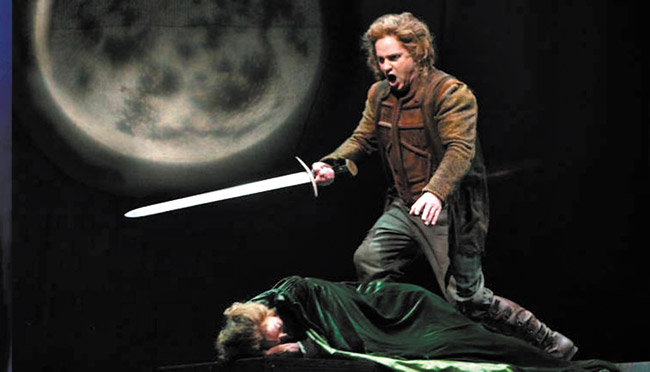Born To Sing
He seemed destined for football. After all, the book, the movie and the spinoff series Friday Night Lights document his high school football team and the craze surrounding it in the Texas city of Odessa. But Kip Wilborn was a different sort of child, even from a young age.
“My parents knew early on that I had a real connection with music,” recalls Wilborn, an Oahu resident. “As a toddler, I wouldn’t let Mom and Dad read to me at night. We’d put a record on the phonograph, and we’d walk around the room in tempo to the music.”
mw-nm-031914-kipwilborn-2
Only then would the boy go to bed.
Come March 28, Wilborn will be headlining Hawaii Opera Theatre’s Pagliacci. He says “dumb luck, or the hand of God” landed him in just the right places at the right moments, catapulting him into the envied league of professionals who sing opera around the world for a living. In fact, he was doing so well that his New York home base could barely contain him. Ten months out of the year he found himself performing in any number of premier American opera houses, as well as prestigious venues in Paris, Moscow, Dublin or Berlin (see a full bio at kipwilborn.com).
A 2006 role in Trittico at HOT brought Wilborn to Hawaii, where he fell in love, married local girl Jan (not an opera singer) and decided to relocate. New York, Hawaii? It didn’t matter much where he rested his weary vocals, because he was on the road so much – until a few years ago, when he decided to clip his wings and explore a more Island-centric lifestyle. One of the major results is a new position as director of New Hope Christian College’s creative arts program. Wilborn already had been teaching voice at the college, but last year he helped the newly christened Pacific Rim School of the Arts establish its accredited degree programs in areas of music, theater and dance.
Wilborn’s plate runneth over, with a stage directorial debut coming up in November for the Manoa Valley Theatre musical Closer Than Ever.
Every so often he takes the stage himself, trading his well-honed opera pipes for the twin tragedia-comedia masks of drama. He played Jean Valjean in Paliku’s acclaimed Les Miserables last year. He glides readily between musical theater and opera.
What changes between Broadway and opera, he says, is the order of priorities. In opera, the priority is vocal, with acting at the bottom of the list, and the list turns practically vice versa with musical theater.
“There’s nothing as wonderful and visceral as doing a duet with a soprano, and the two of you are right in each other’s face and you’re just wailing away,” says the seasoned tenor. “In musical theater, on the other hand, you’re miked so you can go to a whisper and do things interpretively with your voice and with the text that you just cannot do in the opera house because you have to be heard over the orchestra.”
The raw dynamism of that concept is arresting – the idea that opera singers are not miked, making the operatic voice truly a polished instrument.
He’s already satisfied his bucket list role, appearing as Othello on several occasions (skin color aside, the character must be able to fulfill the intense vocal demands of the role). Wilborn notes similarities between the jealous Moor and his role of Canio in HOT’s upcoming production. Recall that in Othello, evil Iago poisons his master’s better sensibilities, making him falsely believe his beloved Desdemona has been unfaithful.
“Once again, you have someone who’s basically an OK guy,” notes Wilborn. “He’s got some passion issues – anger issues – and then the baritone (Louis Otey as Tonio) takes him down the garden path. Now, with Pagliacci, the difference is that Nedda is actually guilty.”
The tenor and baritone have found themselves similarly paired on a number of occasions. Wilborn has been led down that proverbial nescient path by Otey in Othello, again in The Tales of Hoffman and, now, Otey once more goads Wilborn along in Pagliacci.
In his own words, Wilborn sets the stage:
“Canio is an everyman. He rescued this woman from the street. She was practically starved to death, an orphan. She was his ward and became his wife. He’s a middle-aged guy and she’s quite young, so over time she’s unhappy, she wants freedom to be a young woman. He begins to drink – we’ve heard this story and watched it on TV a million times. It is a classic story.”
The story-within-a-story construct finds Canio and Nedda presenting a village play, but as the two face off, their theatrical roles begin to mirror their real-life issues of jealousy and infidelity. Canio tries to summon up the coraggio to hold himself together for the sake of the play, even as he quickly begins to come unglued.
“How do I say my lines when I’m out of my mind with pain and my heart is breaking?” asks Canio, while Nedda denies any wrongdoing. “Then Tonio, who is Taddeo in the play, tosses things in like, ‘Oh her lips are so pure,’ … and at that point, Canio is gone (in a feverish rage),” says Wilborn.
Pagliacci makes up only half of the evening’s entertainment. It is being presented with Carmina Burana, a theatrical series of secular poems originating in a Bavarian monastery also addressing themes of sexual awakening, love and debauchery, while utilizing dance and humor.
“It’s a wonderful pairing of the two,” says Wilborn.
When he’s not singing his heart out, the certified scuba instructor of 16 years is plumbing the depths of the Pacific, or he’s redesigning his elegantly decorated Manoa home. He recounts with humor when, early in his marriage, his wife came home to a completely gutted room. “There was nothing but subfloor, bare walls, and pipes and wires coming out of walls,” much to the shock of the missus, who hadn’t yet been made aware of Wilborn’s home-remodeling skills.
“That’s kind of my therapy,” says the singer, “working on the house.”
The home’s centerpiece is a grand piano, of course.
Pagliacci and Carmina Burana are on stage March 28, 30 and April 1 at Blaisdell Concert Hall. Tickets start at $29. For more information, call 596-7858 or visit hawaiiopera.org.







